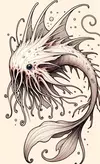Exotic_cetacean
Aesthetics over ethics
No bio...
User ID: 102
Is this right? Fifteen books, ranging from #1-6?
Six main novels, yes. I kind of forgot how many side stories are there, maybe I should read them.
The Book of the New Sun?
I recall reading the first book many moons ago, but I didn't read further. My written down impressions from back then are mostly complaining about overloaded, opaque prose, funnily enough. My taste might have changed, but I would still say that the style is quite different
Does this have an audiobook, and is the narration any good?
It does.
is the narration any good?
No. Though I'm not a fan of fiction audiobooks in the first place
- Prev
- Next


I finished the latest installment of Sun Eater the other day. Unlike a certain infamous fat garden gnome, Ruocchio is a fruitful writer - he puts out a book every 1.5 years or so, with the conclusion of the series planned for next year. I might as well shill it and share some of my impressions here, he well deserves it.
1.Sun Eater is a space opera about a traitor and genocidal murderer to some, hero of mankind to others. Told from his own perspective, as a memoir that he writes at the dusk of his life. From the first pages, Dune and Warhammer influences become apparent, but I quickly forgot about this: don't let anyone say that Ruocchio doesn't have his own creative voice.Considering that criticism of materialism/nihilism is also prominent in Ruocchio's books, and now that Disquiet Gods made his Christian angle explicit, this looks almost funny - like he's taking a dig at the competition.
2.The quality of writing—the way the books are written word-by-word, sentence-by-sentence—is where Ruocchio really shines, and that's fortunate, since I consider this to be the backbone of any work of fiction. In this regard, Ruocchio mogs...wait, the spell checker is upset with me for using zoomer dialect...I meant to say dramatically outperforms most authors I've ever read, and the vast majority of modern writers overall. He will make you open a dictionary a few times if you want to understand some sentences fully, but the prose is by no means overly ornate. It's elegant, memorable, and quite detached from modern conversational English, fittingly for something presented as the writing of a far-future aristocrat. Maybe there's something to say in favor of the more down-to-earth style most common in modern prose, but my guess is that most other writers don't write as Ruocchio simply because they lack the wits and sufficient command of their language.
3.I find evil/irreconcilably antagonistic aliens to be a much more interesting direction to take than the Star Trek approach, or, god forbid, "humans are the real evil". It's not just that it's terribly overdone and tediously misanthropic in practice, hostile aliens seem inherently more plausible. Finding common ground with beings that share our own nature is challenging enough. Competition for resources might not be the most plausible cause for conflict when interstellar civilizations are concerned, but there are any number of others to explore.
4.I enjoy speculations on alien cultures and theology, and here Ruocchio doesn't disappoint either. We humans can observe our flaws and some of the worst animal inclinations in ourselves easily enough. The Cielcin can as well, and as their condition is more degraded and repulsive, even given their habituation to it, they draw more radical conclusions than most human religions. They remind me of Gnostics, believing this universe to be corrupted and seeking release from it. They also resemble Muslims in their rejection of the visual arts.
More options
Context Copy link